塞翁失马--成语故事英文版
塞翁失马 (sài wēng shī mǎ)-英文版成语典故

塞翁失马(sài wēng shī mǎ)Relativity of Hidden ValuesSome Chinese idioms are actually expressions of the dialectical thinking of the ancient Chinese.Many of them believed in the relativity of things and the interchange of two opposing factors like yin and yang.A good example of this in the Chinese language is the idiom Sai Weng Shi Ma, or "when the old man on thefrontier lost his mare."The idiom originates in the "Writings of Prince Huainan," which was compiled by a group of thinkers duringthe Western Han Dynasty (206 BC-24 AD). And the story goes like this:Long ago, there was a young man living near the Great Wall who had a mare. One day, his mare fled into anarea ruled by tribes of ethnic minority people. On learning this, his friends and relatives came to console him.His father told him: "Cheer up, son. Who says this may not be a blessing?"Several months later, the mare came back with a group of fine horses. The friends and relatives were just asjoyous as the young man and they all came to congratulate him. But this time, the old man warned his son,saying: "Who says this won't turn out to be a misfortune?"The young man loved the new horses, and every morning he took a ride on one of them. Since the new horseswere not well tamed, the young man fell off one of them and became crippled.Again, his friends and relatives came to console him and again the father said: "Who says this may not be ablessing in disguise?"A year later, the minority tribes began invading areas inside the Great Wall. Most young people living in thefrontier regions were drafted into the army to fight the invaders. And about nine out of every ten of thedraftees were killed on the battlefields. As a cripple, the owner of the mare was notordered to join the armyand, together with his father, survived the border war."Therefore, a blessing may turn out to be a misfortune, meanwhile the contrary may also be true," the story inthe "Writings of Prince Huainan" concludes.In the idiom, instead of his son, the old man has become the owner of the mare. And the idiomatic saying isusually followed by the phrase An Zhi Fei Fu, meaning, "Who could have guessed it was a blessing indisguise?"Now, Sai Weng Shi Ma, and An Zhi Fei Fu (when the old man on the frontier lost his mare, who could haveguessed it was a blessing in disguise?) is frequently cited by people when they try to console someone whohas suffered an unexpected loss or mishap.。
塞翁失马英语版
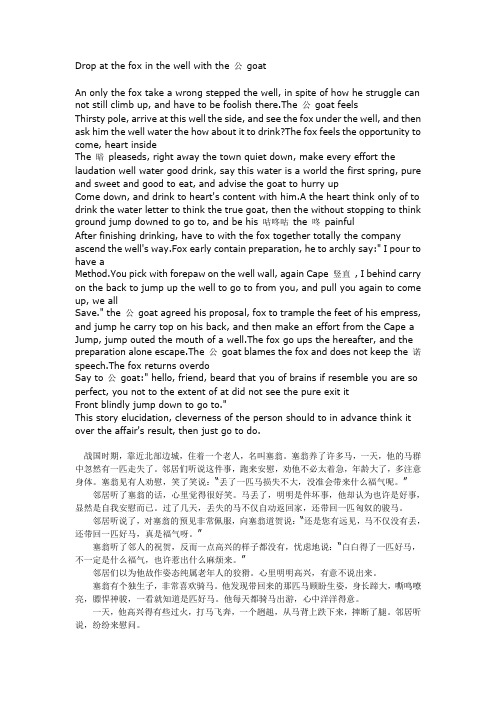
Drop at the fox in the well with the 公goatAn only the fox take a wrong stepped the well, in spite of how he struggle can not still climb up, and have to be foolish there.The 公goat feelsThirsty pole, arrive at this well the side, and see the fox under the well, and then ask him the well water the how about it to drink?The fox feels the opportunity to come, heart insideThe 暗pleaseds, right away the town quiet down, make every effort the laudation well water good drink, say this water is a world the first spring, pure and sweet and good to eat, and advise the goat to hurry upCome down, and drink to heart's content with him.A the heart think only of to drink the water letter to think the true goat, then the without stopping to think ground jump downed to go to, and be his 咕咚咕the 咚painfulAfter finishing drinking, have to with the fox together totally the company ascend the well's way.Fox early contain preparation, he to archly say:" I pour to have aMethod.You pick with forepaw on the well wall, again Cape 竖直, I behind carry on the back to jump up the well to go to from you, and pull you again to come up, we allSave." the 公goat agreed his proposal, fox to trample the feet of his empress, and jump he carry top on his back, and then make an effort from the Cape a Jump, jump outed the mouth of a well.The fox go ups the hereafter, and the preparation alone escape.The 公goat blames the fox and does not keep the 诺speech.The fox returns overdoSay to 公goat:" hello, friend, beard that you of brains if resemble you are so perfect, you not to the extent of at did not see the pure exit itFront blindly jump down to go to."This story elucidation, cleverness of the person should to in advance think it over the affair's result, then just go to do.战国时期,靠近北部边城,住着一个老人,名叫塞翁。
塞翁失马英语故事翻译
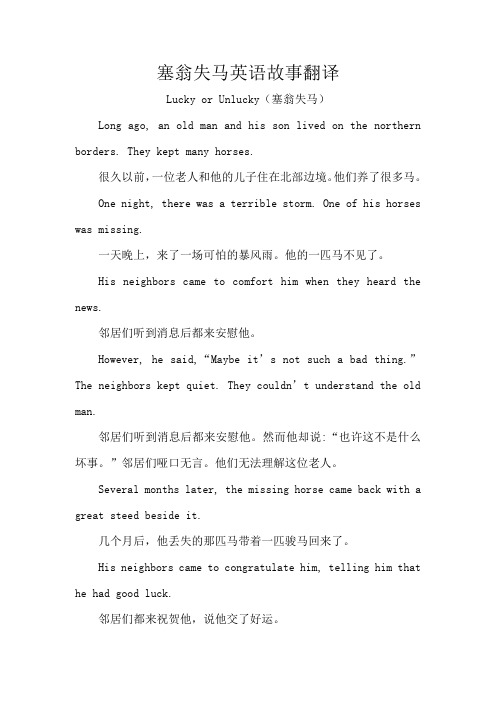
塞翁失马英语故事翻译Lucky or Unlucky(塞翁失马)Long ago, an old man and his son lived on the northern borders. They kept many horses.很久以前,一位老人和他的儿子住在北部边境。
他们养了很多马。
One night, there was a terrible storm. One of his horses was missing.一天晚上,来了一场可怕的暴风雨。
他的一匹马不见了。
His neighbors came to comfort him when they heard the news.邻居们听到消息后都来安慰他。
However, he said,“Maybe it’s not such a bad thing.” The neighbors kept quiet. They couldn’t understand the old man.邻居们听到消息后都来安慰他。
然而他却说:“也许这不是什么坏事。
”邻居们哑口无言。
他们无法理解这位老人。
Several months later, the missing horse came back with a great steed beside it.几个月后,他丢失的那匹马带着一匹骏马回来了。
His neighbors came to congratulate him, telling him that he had good luck.邻居们都来祝贺他,说他交了好运。
But the old man said, “Perhaps my horse returning is not such a good th ing.”The neighbors kept quiet again.They really couldn’t understand the old man.但老人说:“也许我的马回来并不是一件好事。
塞翁失马英文版简短

塞翁失马英文版简短Once upon a time,there was an old man who lived with his son on the borders of the country.They both very much enjoyed riding horses. One day,a servant reported to the old man,“One of our good horses has gone missing.It seems the horse ran across to the neighboring country.”Old man’s friends came and comforted him.However,the old man said:“Well,this is not necessarily a bad thing.Who knows!”Couple of months later,a strange thing happened.The missing horse came back,accompanied by a great steed from the neighboring country. When his friends congratulated him on this great news,the old man said:“Well,this might bring us bad luck.”One day,his son was having fun riding on the fine[new]steed. Suddenly,he fell from the hose and broke his leg.His son was never able to walk again.Again,his friends came to comfort the old man.But the old man was not bothered and said:“This accident might bring us good luck in the future.”A year later,all young men in the country were drafted to join a war. Most young men who fought died on the battlefield.Luckily,his son avoided entering the war because of his broken leg.从前,一位老翁和他的儿子住在塞外的边境上。
塞翁失马英语故事

关于塞翁失马的英语故事有中文翻译-三篇1.The Loss of HorseIn a border town, lived an old man named Sailong. One day, his horse ran away to the land of the Huns. Soon after, the horse returned with another horse from the Huns. When the neighbors saw this, they were happy for him, thinking he had gained a fortune from the misfortune. However, Sailong said, "This horse may bring me disaster."Soon after, Sailong's son was riding the horse and playing along the border when the horse stumbled and fell off the cliff, killing his son. When the neighbors heard this news, they were sad, thinking Sailong had suffered a great loss. However, Sailong said, "I lost my son, but maybe this will turn out to be a blessing in disguise."2.The Loss of Horse, Who Knows It May Be a Blessing in DisguiseIn an ancient border town, lived an old man called Sailong. He had a good horse which one day ran away to the land of the Huns. When the neighbors heard about this, they came to comfort Sailong, thinking he had suffered an misfortune. However, Sailong said, "I lost my horse, but maybe this will turn out to be a blessingin disguise."Some time later, Sailong's son was riding the horse and playing along the border when the horse stumbled and fell off the cliff, killing him. When the neighbors heard this news, they were sad, thinking Sailong had suffered a great loss. However, Sailong said, "I lost my son, but maybe this will turn out to be a blessing in disguise."3.The Loss of Horse, Who Knows It May Be a Blessing in DisguiseIn a small village on the border, lived an old man called Sailong. He had a good horse which one day ran away to the land of the Huns. When the neighbors heard about this, they came to comfort Sailong, thinking he had suffered an misfortune. However, Sailong said, "I lost my horse, but maybe this will turn out to be a blessing in disguise."Some time later, when the Huns invaded the village, everyone fled. But Sailong's son escaped on the horse that had returned from the Huns' land. When the neighbors saw Sailong's son returned safely, they were surprised, thinking his loss had been compensated. However, Sailong said, "I lost my horse and son, but maybe this will turn out to be a blessing in disguise."【中文翻译】1.塞翁失马有一个边塞的老人,人们都称他为塞翁。
塞翁失马焉知非福英文故事
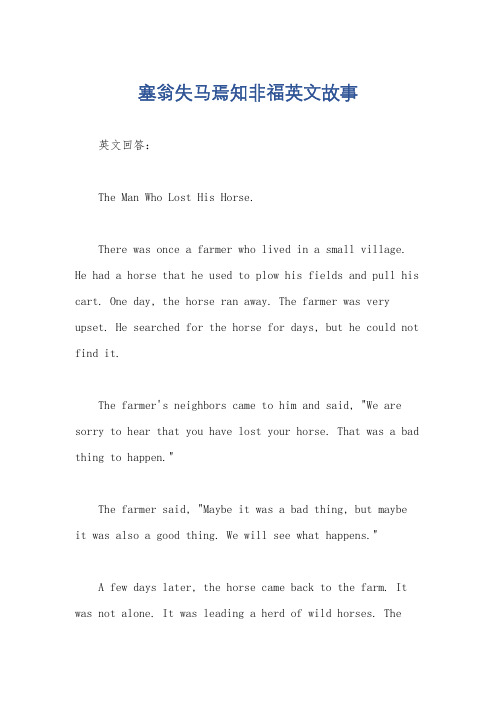
塞翁失马焉知非福英文故事英文回答:The Man Who Lost His Horse.There was once a farmer who lived in a small village. He had a horse that he used to plow his fields and pull his cart. One day, the horse ran away. The farmer was very upset. He searched for the horse for days, but he could not find it.The farmer's neighbors came to him and said, "We are sorry to hear that you have lost your horse. That was a bad thing to happen."The farmer said, "Maybe it was a bad thing, but maybe it was also a good thing. We will see what happens."A few days later, the horse came back to the farm. It was not alone. It was leading a herd of wild horses. Thefarmer was very happy. He now had more horses than he had before.The farmer's neighbors came to him and said, "We were wrong to say that it was a bad thing that you lost your horse. It turned out to be a good thing after all."The farmer said, "Yes, but maybe it was a good thing, but maybe it was also a bad thing. We will see what happens."A few months later, the farmer's son was riding one of the wild horses. The horse threw the boy and he broke his leg. The farmer was very upset.The farmer's neighbors came to him and said, "We are sorry to hear that your son has broken his leg. That was a bad thing to happen."The farmer said, "Maybe it was a bad thing, but maybe it was also a good thing. We will see what happens."A few weeks later, the country went to war. All the young men in the village were drafted into the army. The farmer's son was not drafted because he had a broken leg.The farmer's neighbors came to him and said, "We were wrong to say that it was a bad thing that your son broke his leg. It turned out to be a good thing after all."The farmer said, "Yes, but maybe it was a good thing, but maybe it was also a bad thing. We will see what happens."The farmer never knew whether it was a good thing or a bad thing that he lost his horse. But he knew that everything happens for a reason.中文回答:塞翁失马。
英语成语故事:塞翁失马

英语成语故事:塞翁失马Near China's northern borders lived a man well versed in the practices of Taoism. His horse, for no reason at all, got into the territory of the northern tribes. Everyone commiserated with him."Perhaps this will soon turn out to be a blessing," said his father.After a few months, his animal came back, leading a fine horse from the north. Everyone congratulated him."Perhaps this will soon turn out to be a cause of misfortune," said his father.Since he was well-off and kept good horses his son became fond of riding and eventually broke his thigh bone falling from a horse. Everyone commiserated with him."Perhaps this will soon turn out to be a blessing," said his father.One year later, the northern tribes started a big invasionof the border regions. All able-bodied young men took up arms and fought against the invaders, and as a result, around the border nine out of ten men died. This man's son did not join in the fighting because he was crippled and so both the boy and his father survived.战国时期,靠近北部边城,住着一个老人,名叫塞翁。
古代英语故事短文:塞翁失马Blessing or Bane

古代英语故事短文:塞翁失马Blessing or BaneNear China's northern borders lived a man well versed in the practices of Taoism. His horse, for no reason at all, got into the territory of the northern tribes. Everyone commiserated with him."Perhaps this will soon turn out to be a blessing," said his father.After a few months, his animal came back, leading a fine horse from the north. Everyone congratulated him."Perhaps this will soon turn out to be a cause of misfortune," said his father.Since he was well-off and kept good horses his son became fond of riding and eventually broke his thigh bone fallingfrom a horse. Everyone commiserated with him."Perhaps this will soon turn out to be a blessing," said his father.One year later, the northern tribes started a biginvasion of the border regions. All able-bodied young mentook up arms and fought against the invaders, and as a result, around the border nine out of ten men died. This man's sondid not join in the fighting because he was crippled and so both the boy and his father survived.英语故事短文带翻译:战国时期,靠近北部边城,住着一个老人,名叫塞翁。
中国寓言故事哲理版英文版

中国寓言故事哲理版英文版以下是中国寓言故事《塞翁失马》的哲理版英文版:The loss of a horseIn a small village, there lived an old man named "Mr. Sài". He was always cheerful and content, even when he lost his favorite horse. His neighbors sympathized with him, saying that it was such a shame to lose such a fine horse, but Mr. Sài merely shrugged and said, "Perhaps this loss will turn out to be a good thing."Months later, the horse returned, bringing with him a whole herd of wild horses. The neighbors were amazed, saying that Mr. Sài had been right all along. But Mr. Sài just smiled and said, "Unexpected gains may be a good thing, but they can also be a burden."Soon after, the young men of the village wanted to ride the wild horses, but they were afraid. Mr. Sài's son, being young and bold, volunteered to ride one of the horses. He was thrown off and broke his leg. Again, the neighbors came to comfort Mr. Sài, but he only said, "Every cloud has a silver lining."Months later, the army came to the village to draft men for the war. Seeing that Mr. Sài's son had a broken leg, theypassed him by. The neighbors once again marveled at Mr. Sài's foresight, but he simply said, "It is not what we see that is fate, but what we do not see."The moral of the story is that in life, there are no absolute gains or losses. What seems like a loss may turn out to be a gain, and vice versa. We should not be too quick to judge events as good or bad, but instead see them as opportunities for learning and growth.。
英语作文讲塞翁失马的故事
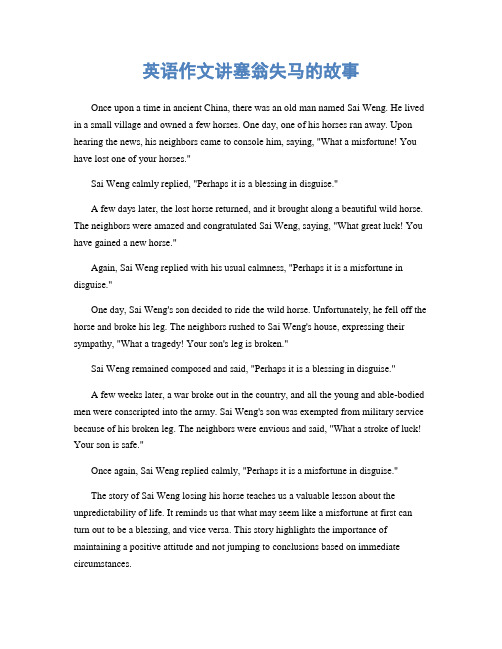
英语作文讲塞翁失马的故事Once upon a time in ancient China, there was an old man named Sai Weng. He lived in a small village and owned a few horses. One day, one of his horses ran away. Upon hearing the news, his neighbors came to console him, saying, "What a misfortune! You have lost one of your horses."Sai Weng calmly replied, "Perhaps it is a blessing in disguise."A few days later, the lost horse returned, and it brought along a beautiful wild horse. The neighbors were amazed and congratulated Sai Weng, saying, "What great luck! You have gained a new horse."Again, Sai Weng replied with his usual calmness, "Perhaps it is a misfortune in disguise."One day, Sai Weng's son decided to ride the wild horse. Unfortunately, he fell off the horse and broke his leg. The neighbors rushed to Sai Weng's house, expressing their sympathy, "What a tragedy! Your son's leg is broken."Sai Weng remained composed and said, "Perhaps it is a blessing in disguise."A few weeks later, a war broke out in the country, and all the young and able-bodied men were conscripted into the army. Sai Weng's son was exempted from military service because of his broken leg. The neighbors were envious and said, "What a stroke of luck! Your son is safe."Once again, Sai Weng replied calmly, "Perhaps it is a misfortune in disguise."The story of Sai Weng losing his horse teaches us a valuable lesson about the unpredictability of life. It reminds us that what may seem like a misfortune at first can turn out to be a blessing, and vice versa. This story highlights the importance of maintaining a positive attitude and not jumping to conclusions based on immediate circumstances.Life is full of ups and downs, and we often encounter situations that challenge our perspective. It is easy to get caught up in the moment and label events as either good or bad. However, the story of Sai Weng teaches us to embrace the uncertainty of life and remain open to the possibilities that lie ahead.By adopting a more balanced and accepting mindset, we can navigate through life's challenges with grace and resilience. Instead of dwelling on the negative aspects of a situation, we can focus on finding the silver linings and learning from every experience.The story of Sai Weng losing his horse is a timeless tale that reminds us to embrace the ebb and flow of life. It teaches us to let go of our preconceived notions of what is good or bad and to trust in the inherent wisdom of the universe. Just like Sai Weng, we too can find peace and contentment by accepting the ever-changing nature of life and embracing the lessons it has to offer.In conclusion, the story of Sai Weng losing his horse serves as a powerful reminder that life is unpredictable, and what may seem like a misfortune can turn out to be a blessing. It encourages us to approach life's challenges with an open mind and a positive attitude. By doing so, we can navigate through the ups and downs of life with grace and resilience. Let us embrace the wisdom of Sai Weng and find solace in the uncertainties of life.。
塞翁失马的寓意英文作文
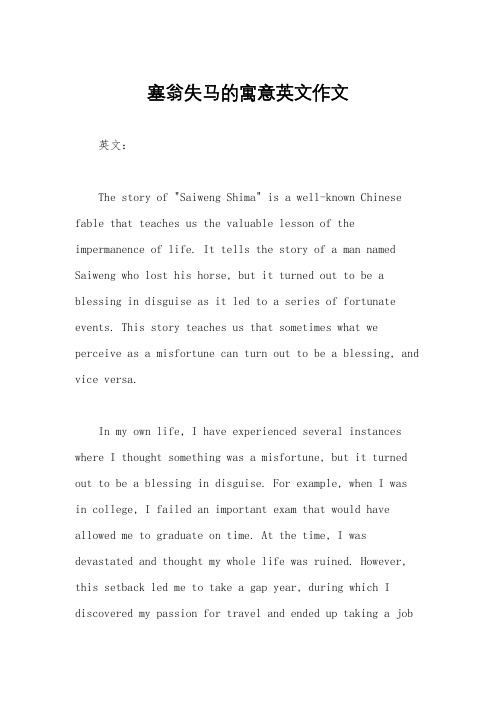
塞翁失马的寓意英文作文英文:The story of "Saiweng Shima" is a well-known Chinese fable that teaches us the valuable lesson of the impermanence of life. It tells the story of a man named Saiweng who lost his horse, but it turned out to be a blessing in disguise as it led to a series of fortunate events. This story teaches us that sometimes what we perceive as a misfortune can turn out to be a blessing, and vice versa.In my own life, I have experienced several instances where I thought something was a misfortune, but it turned out to be a blessing in disguise. For example, when I was in college, I failed an important exam that would have allowed me to graduate on time. At the time, I was devastated and thought my whole life was ruined. However, this setback led me to take a gap year, during which I discovered my passion for travel and ended up taking a jobthat allowed me to travel the world. If I had graduated on time, I would have missed out on this incredible opportunity.Another example is when I lost my job due to budget cuts. At the time, I was upset and worried about how I would pay my bills and support myself. However, this led me to start my own business, which has been incrediblyfulfilling and successful. If I had not lost my job, I may have never taken the risk to start my own business.In both of these instances, what I initially thought was a misfortune turned out to be a blessing in disguise. The story of "Saiweng Shima" reminds us that life is unpredictable, and we should not be too attached to our current circumstances as they can change at any moment. We should always keep an open mind and be willing to embrace new opportunities, even if they initially seem like misfortunes.中文:《塞翁失马》这个寓言故事告诉我们生命的无常。
英语故事-塞翁失马
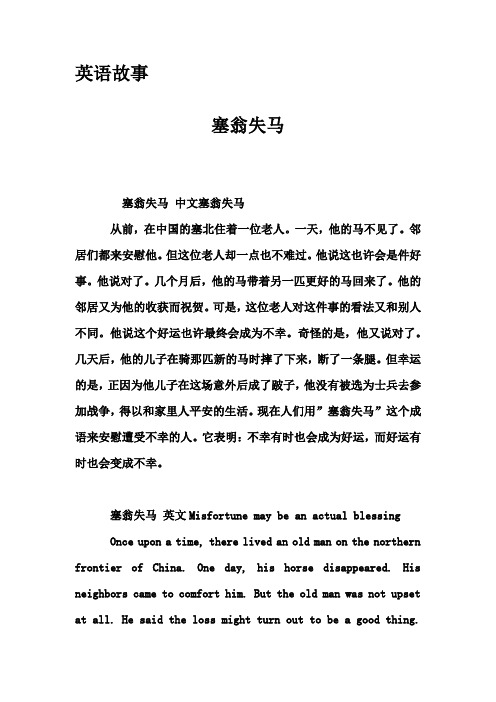
英语故事塞翁失马塞翁失马中文塞翁失马从前,在中国的塞北住着一位老人。
一天,他的马不见了。
邻居们都来安慰他。
但这位老人却一点也不难过。
他说这也许会是件好事。
他说对了。
几个月后,他的马带着另一匹更好的马回来了。
他的邻居又为他的收获而祝贺。
可是,这位老人对这件事的看法又和别人不同。
他说这个好运也许最终会成为不幸。
奇怪的是,他又说对了。
几天后,他的儿子在骑那匹新的马时摔了下来,断了一条腿。
但幸运的是,正因为他儿子在这场意外后成了跛子,他没有被选为士兵去参加战争,得以和家里人平安的生活。
现在人们用”塞翁失马”这个成语来安慰遭受不幸的人。
它表明:不幸有时也会成为好运,而好运有时也会变成不幸。
塞翁失马英文Misfortune may be an actual blessingOnce upon a time, there lived an old man on the northern frontier of China. One day, his horse disappeared. His neighbors came to comfort him. But the old man was not upset at all. He said the loss might turn out to be a good thing.And he was right. A few months later, his horse came back with another horse that was even better. His neighbors came to congratulate him on his gain. But once again, the old man viewed the event differently. He said this “good luck” might turn out to be misfortune in the end. Strangely, he was right again.A few days later, his son fell from the new horse and broke his leg. But fortunately, since his son was lame after that accident, he was not chosen to be a soldier to fight in the following war so that he lived with family safely.Nowadays people use “The old man on the frontier lost his horse” to comfort those who have some misfortune. It implies: Bad luck sometimes turns out to be good luck, and good luck can sometimes be bad.。
英语作文讲塞翁失马的故事
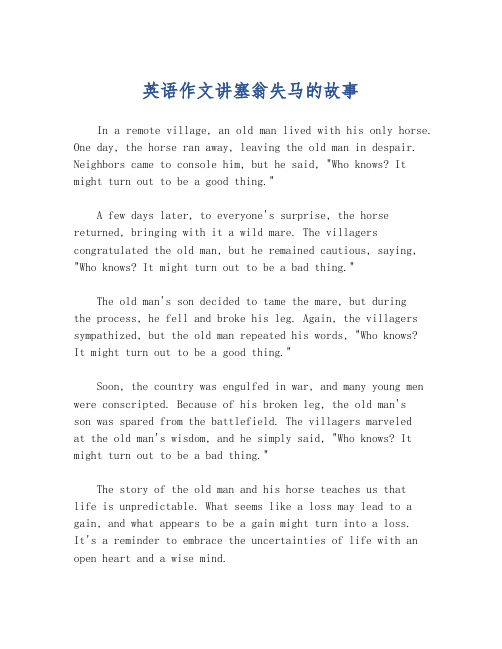
英语作文讲塞翁失马的故事In a remote village, an old man lived with his only horse. One day, the horse ran away, leaving the old man in despair. Neighbors came to console him, but he said, "Who knows? It might turn out to be a good thing."A few days later, to everyone's surprise, the horse returned, bringing with it a wild mare. The villagers congratulated the old man, but he remained cautious, saying, "Who knows? It might turn out to be a bad thing."The old man's son decided to tame the mare, but duringthe process, he fell and broke his leg. Again, the villagers sympathized, but the old man repeated his words, "Who knows?It might turn out to be a good thing."Soon, the country was engulfed in war, and many young men were conscripted. Because of his broken leg, the old man'sson was spared from the battlefield. The villagers marveledat the old man's wisdom, and he simply said, "Who knows? It might turn out to be a bad thing."The story of the old man and his horse teaches us thatlife is unpredictable. What seems like a loss may lead to a gain, and what appears to be a gain might turn into a loss.It's a reminder to embrace the uncertainties of life with an open heart and a wise mind.。
赛翁失马焉知非福英语作文
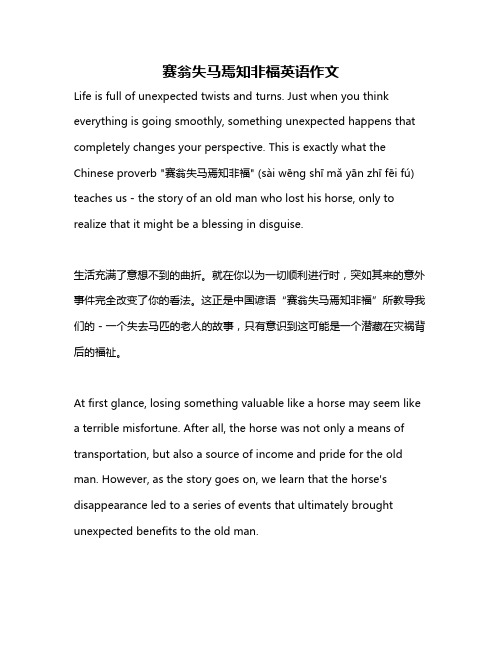
赛翁失马焉知非福英语作文Life is full of unexpected twists and turns. Just when you think everything is going smoothly, something unexpected happens that completely changes your perspective. This is exactly what the Chinese proverb "赛翁失马焉知非福" (sài wēng shī mǎ yān zhīfēi fú) teaches us - the story of an old man who lost his horse, only to realize that it might be a blessing in disguise.生活充满了意想不到的曲折。
就在你以为一切顺利进行时,突如其来的意外事件完全改变了你的看法。
这正是中国谚语“赛翁失马焉知非福”所教导我们的 - 一个失去马匹的老人的故事,只有意识到这可能是一个潜藏在灾祸背后的福祉。
At first glance, losing something valuable like a horse may seem like a terrible misfortune. After all, the horse was not only a means of transportation, but also a source of income and pride for the old man. However, as the story goes on, we learn that the horse's disappearance led to a series of events that ultimately brought unexpected benefits to the old man.乍一看,失去像马这样有价值的东西可能看起来像是一场可怕的不幸。
介绍塞翁失马英文作文
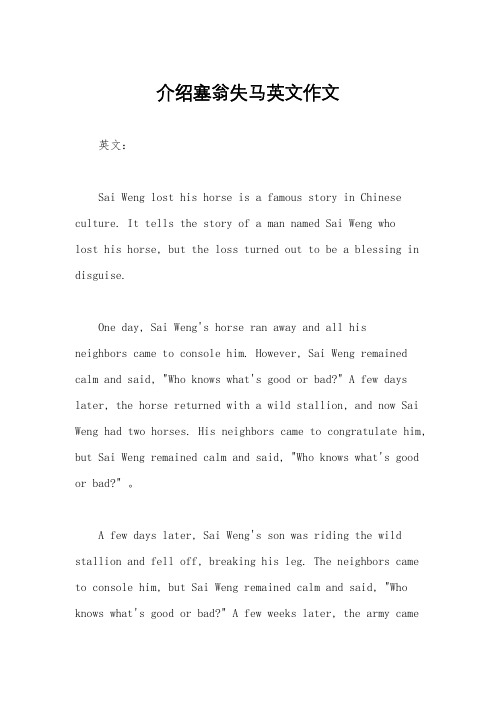
介绍塞翁失马英文作文英文:Sai Weng lost his horse is a famous story in Chinese culture. It tells the story of a man named Sai Weng wholost his horse, but the loss turned out to be a blessing in disguise.One day, Sai Weng's horse ran away and all hisneighbors came to console him. However, Sai Weng remained calm and said, "Who knows what's good or bad?" A few days later, the horse returned with a wild stallion, and now Sai Weng had two horses. His neighbors came to congratulate him, but Sai Weng remained calm and said, "Who knows what's good or bad?" 。
A few days later, Sai Weng's son was riding the wild stallion and fell off, breaking his leg. The neighbors came to console him, but Sai Weng remained calm and said, "Who knows what's good or bad?" A few weeks later, the army cameto the village to recruit young men for war, but Sai Weng's son was exempted because of his broken leg.This story teaches us that we should not be too quickto judge the events that happen in our lives. What may seem like a misfortune may turn out to be a blessing in disguise, and vice versa.中文:塞翁失马是中国文化中的一个著名故事。
塞翁失马焉知非福的英语故事
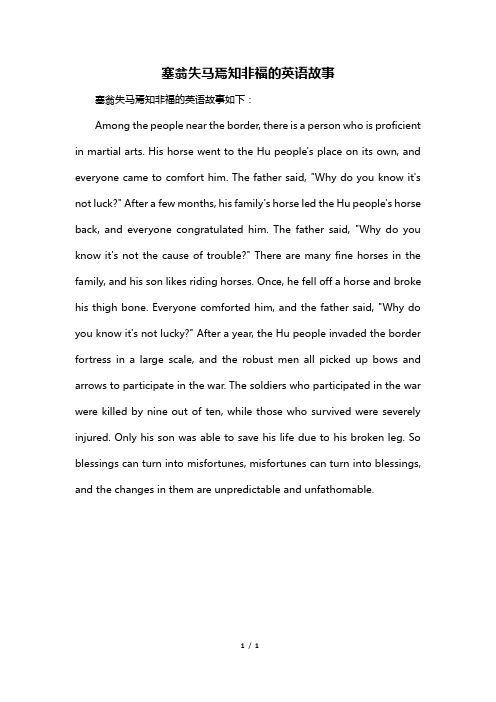
塞翁失马焉知非福的英语故事塞翁失马焉知非福的英语故事如下:Among the people near the border, there is a person who is proficient in martial arts. His horse went to the Hu people's place on its own, and everyone came to comfort him. The father said, "Why do you know it's not luck?" After a few months, his family's horse led the Hu people's horse back, and everyone congratulated him. The father said, "Why do you know it's not the cause of trouble?" There are many fine horses in the family, and his son likes riding horses. Once, he fell off a horse and broke his thigh bone. Everyone comforted him, and the father said, "Why do you know it's not lucky?" After a year, the Hu people invaded the border fortress in a large scale, and the robust men all picked up bows and arrows to participate in the war. The soldiers who participated in the war were killed by nine out of ten, while those who survived were severely injured. Only his son was able to save his life due to his broken leg. So blessings can turn into misfortunes, misfortunes can turn into blessings, and the changes in them are unpredictable and unfathomable.1/ 1。
塞翁失马焉知非福中英双语版

塞翁失马从前,在中国的塞北住着一位老人。
一天,他的马不见了。
邻居们都来安慰他。
但这位老人却一点也不难过。
他说这也许会是件好事。
他说对了。
几个月后,他的马带着另一匹更好的马回来了。
他的邻居又为他的收获而祝贺。
可是,这位老人对这件事的看法又和别人不同。
他说这个好运也许最终会成为不幸。
奇怪的是,他又说对了。
几天后,他的儿子在骑那匹新的马时摔了下来,断了一条腿。
但幸运的是,正因为他儿子在这场意外后成了跛子,他没有被选为士兵去参加战争,得以和家里人平安的生活。
现在人们用"塞翁失马"这个成语来安慰遭受不幸的人。
它表明:不幸有时也会成为好运,而好运有时也会变成不幸。
塞 frontier 安慰 comfort 难过 upset祝贺 congratulate 跛子 lame 战争 warThe old man on the frontier lost his horseOnce upon a time, there lived an old man on the northern frontier of China. One day, his horse disappeared. His neighbors came to comfort him. But the old man was not upset at all. He said the loss might turn out to be a good thing. And he was right. A few months later, his horse came back with another horse that was even better. His neighbors came to congratulate him on his gain. But once again, the old man viewed the event differently. He said this "good luck" might turn out to be misfortune in the end. Strangely, he was right again. A few days later, his son fell from the new horse and broke his leg. But fortunately, since his son was lame after that accident, he was not chosen to be a soldier to fight in the following war so that he lived with family safely.Nowadays people use "The old man on the frontier lost his horse" to comfort those who have some misfortune. It implies: Bad luck sometimes turns out to be good luck, and good luck can sometimes be bad。
塞翁失马英文四级作文
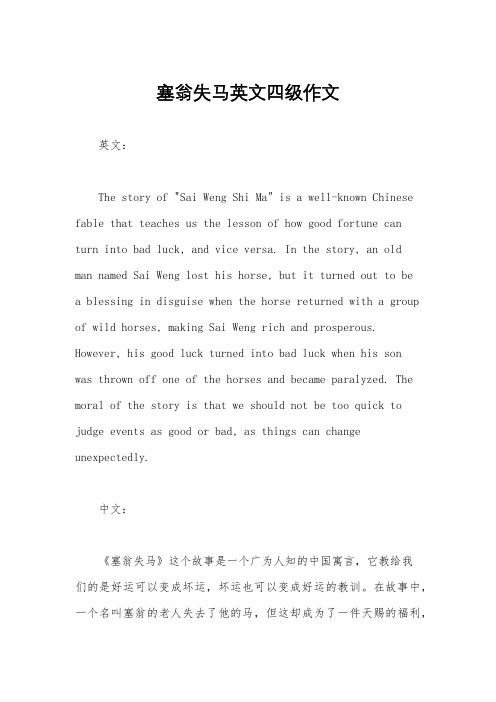
塞翁失马英文四级作文英文:The story of "Sai Weng Shi Ma" is a well-known Chinese fable that teaches us the lesson of how good fortune canturn into bad luck, and vice versa. In the story, an old man named Sai Weng lost his horse, but it turned out to bea blessing in disguise when the horse returned with a group of wild horses, making Sai Weng rich and prosperous. However, his good luck turned into bad luck when his sonwas thrown off one of the horses and became paralyzed. The moral of the story is that we should not be too quick to judge events as good or bad, as things can change unexpectedly.中文:《塞翁失马》这个故事是一个广为人知的中国寓言,它教给我们的是好运可以变成坏运,坏运也可以变成好运的教训。
在故事中,一个名叫塞翁的老人失去了他的马,但这却成为了一件天赐的福利,因为这匹马带回了一群野马,让塞翁变得富有和繁荣。
然而,他的好运又变成了坏运,因为他的儿子被其中一匹马摔下来后瘫痪了。
这个故事的寓意是我们不应该过于快速地判断事情是好的还是坏的,因为事情会出乎意料地改变。
- 1、下载文档前请自行甄别文档内容的完整性,平台不提供额外的编辑、内容补充、找答案等附加服务。
- 2、"仅部分预览"的文档,不可在线预览部分如存在完整性等问题,可反馈申请退款(可完整预览的文档不适用该条件!)。
- 3、如文档侵犯您的权益,请联系客服反馈,我们会尽快为您处理(人工客服工作时间:9:00-18:30)。
Saiwong and his lost horse
塞翁失马
Traditional Chinese life philosophy on nutrition draws heavily from Taoism theory. In an ancient China Taoism book,"Huainan Zi 淮南子", there is a famous story about "blessings" and "misfortune".
Near China's northern borders lived a man well versed in the practices of Taoism. His father was named Saiwong, which means "old man who lives near the border. One day, his horse, for no reason at all, found itself in the territory of one of the northern tribes. Everyone commiserated with him.
"Don't be so upset, it's just a horse, please take care of yourself."
"Perhaps this will soon turn out to be a blessing," said his father, Saiwong.
The neighbors didn't understand what Saiwong's meant and gossip spread about this "weird old man".
After a few months, the lost horse came back, leading a fine horse from the north. Everyone congratulated him.
"Perhaps this will soon turn out to be a cause of misfortune," said Saiwong.
People were annoyed by this. Since Saiwong's son was well-off and kept good horses he became fond of riding, and eventually broke his thigh bone falling from a horse. It caused a massive problem at the time because
a young man was very important in terms of labour for the family. Everyone commiserated with him. But his father said:"Perhaps this will soon turn out to be a blessing."
Again, the neighbors were confused by Saiwong's logic.
One year later, the northern tribes started a big invasion of the border regions. All able-bodied young men took up arms and fought against the invaders, and as a result, around the border, nine out of ten men died. Saiwong's son did not join in the fighting because he was crippled and so both the boy and his father survived.
"Huainan Zi" uses this story to teach a theory rooted in Taoism that says that in a long run, blessings and misfortunes are next door neighbors. In the short term, people do not need to worry too much about them.。
